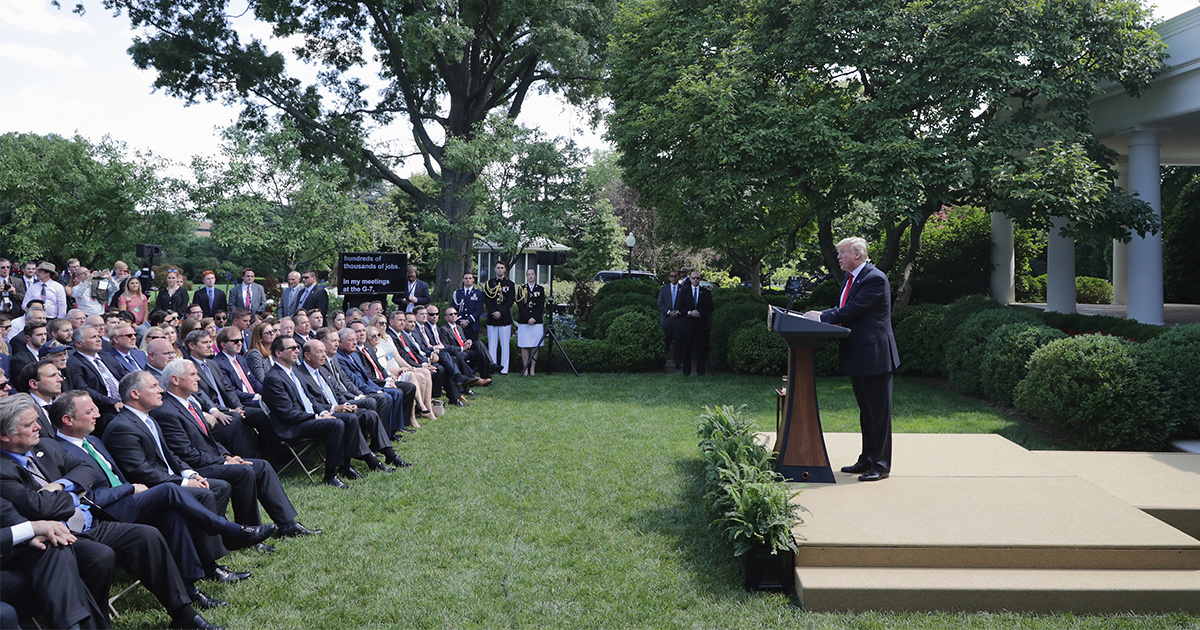
3 Ways the ‘Trump Effect’ Puts the Brakes on International Climate Action

As representatives of around 200 countries kicked off the COP24 meeting in Katowice, Poland this week to develop a rulebook for implementing the Paris agreement, a new study looked at how U.S. President Donald Trump‘s decision to withdraw has affected the landmark climate accord. The verdict? The so-called ‘Trump Effect’ has significantly slowed the momentum of global climate action.
The study, published Monday by Joseph Curtin of the Institute of International & European Affairs (IIEA), examined the fate of the 2015 agreement to limit global warming to “well below” two degrees Celsius above pre-industrial levels in the context of Trump’s announcement in June 2017 that the U.S. would pull out.
“[T]he ‘Trump Effect’ has created a powerful countervailing force acting against the momentum [the agreement] hoped to generate,” Curtin wrote.
As #COP24 gets underway in #Katowice our latest analysis by #ClimateChange Senior Fellow @jmcurtin argues that the ‘Trump effect’ is slowing down global #decarbonisation when the #ParisAgreement sought to speed it up. Read it here https://t.co/bMi3LDBMOH
— IIEA (@iiea) December 3, 2018
Trump’s decision has slowed the pace of change in three key ways, Curtin found.
- “U.S. Federal rollbacks have increased the attractiveness of fossil fuel investments globally”: The signing of the Paris agreement led investors to flee assets like coal and tar sands out of fear that they would lose money if the world really moved away from fossil fuels. However, Trump’s decision to withdraw, as well as his moves to reverse Obama-era climate policy domestically, led those investments to rise again in 2017. In that year, JPMorgan Chase upped its tar sands investments by a factor of four, 36 banks increased their coal investments by six percent after decreasing them 38 percent the year before and investment in renewable energy decreased by seven percent.
- “The US decision to withdraw from the Agreement has created moral and political cover for others to follow suit”: While key players like the EU, India and China have remained committed to the agreement, a few countries have slowed or reversed action and used Trump’s decision as an excuse. Australia justified dumping legislation designed to help it meet its Paris pledges with Trump’s actions and Turkey’s President Recep Tayyip Erdoğan said he would not ratify the agreement “after that step taken by America.” Brazil‘s newly elected right-wing President Jair Bolsonaro tweeted support of Trump’s withdrawal decision at the time, and did at one point threaten to withdraw as well. Most recently, he said Brazil would not host a major climate conference next year, BBC News reported.
- “Goodwill at international negotiations has been damaged“: Obama had promised $3 billion to a Green Climate Fund created in 2009, a decision Trump reversed, leaving the fund with a $2 billion shortfall, which has increased tensions in the negotiations surrounding it. Further, one of the trickiest points in Paris negotiations is the pledge made by developed countries to help developing countries decarbonize to the tune of $100 billion a year. Developed countries, including the U.S., don’t want to report their financial commitments as part of their pledge updates and want more private finance to pick up the tab. The Trump administration’s rigid position on this may be influencing other developed countries, working to “sour negotiations,” the report found. Finally, the report predicted it was unlikely that other countries would offer more ambitious Paris pledges without a similar move from the U.S.
Curtin ended the report with a sly call to action to U.S. voters who care about climate change.
“[T]he Paris Agreement will resist the Trump Effect in the short-run,” he wrote. “But in the medium- and longer-term, it will continue to be assailed by instability and uncertainty, unless these underlying structural factors can be finally addressed; and this is a job that can only be performed by the American electorate. Meanwhile, the window of opportunity for achieving the 2° C temperature target is rapidly closing.”
The Trump Effect on Climate News https://t.co/7Y9IKKO2eS @NRDC @ClimateReality @350 @truthout @ClimateNexus
— EcoWatch (@EcoWatch) February 13, 2018

 233k
233k  41k
41k  Subscribe
Subscribe 